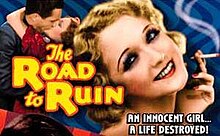Plot
Ann Dixon and Eve Monroe are high school friends. Eve is more "experienced" and shows Ann some things that are new to Ann, like smoking and drinking alcohol. Eve laughs when Ann asks her, "Do you let boys kiss you?" One weekend, Ann and Eve go to the lake with fellow high schoolers, Tommy and Ed. After what must have been Ann's first sexual experience, she cries pitifully and Tommy asks her whether she hates him. But, Ann continues to see Tommy and they go to restaurants where they drink alcohol and kiss passionately.
One night while out drinking, Ralph notices Ann and likes what he sees. Noticing that her date, Tommy, has had too much to drink, he moves in on Ann. Since Tommy is out of it, Ann joins Ralph for a drink. When Tommy tries to fight Ralph, he and Ed are kicked out of the place. Ann drops Tommy, and he warns her that Ralph is "bad news for a girl like you." One night, at Ralph's home he gives Ann a "special brew" and they end up (apparently) having intercourse, since Ann has no resistance.
Ann continues to see Ralph and lies to her parents about where she has been. Ann and Ralph attend a party at Brad's where most of the guests are drinking to excess. The party guests begin a game akin to strip poker, played with dice. Only the girls seem to lose their clothing, and eventually lots of the guests noisily end up in the swimming pool, lacking much of their clothes. Disgruntled neighbors are outraged and call the police. Ralph sees the cops arrive, and leaves, abandoning Ann to be arrested with Eve. Ann and Eve end up with Mrs. Merrill, the head of the Girls Division of the Juvenile Department of the police. The girls are required to be "examined" by a doctor before they can be released. The examination reveals Ann is a "Sex Delinquent." Mrs. Merrill tells Mrs. Dixon that today's youth needs the armor of knowledge and sex instruction.
Later, we find out that Eve is also a sex delinquent, but she has responded successfully to "treatment." Then, we find out through innuendo that Ann is going to have a baby. She tells Ralph and finds out that he is married. He also (apparently) suggests she get an abortion. The abortion, "a clumsy, unsanitary operation" leaves Ann gravely ill. On Ann's deathbed, her mother asks Ann for forgiveness for utterly failing her; Ann quietly slips away.
Production
The Road to Ruin is a sound re-make of a 1928 silent film of the same name, written and produced by Willis Kent and also starring Helen Foster. [1] Foster, reprising her role as a high school girl, was 27 years old at the time, and six years older than her on-screen boyfriend, Glen Boles.
The titles and composers of the three songs performed in the film are not recorded. [1]
To promote the film, the producers advertised that it was not to be shown to anyone under eighteen, implying that it contained salacious material. Film censors in Virginia required a "record number" of cuts in the film before clearing it for release, according to Film Daily, while in Detroit, the film was boycotted by the Catholic Church, but was cleared by the local censors after some cuts. [1]
A novelization of the film was put out by the producers, apparently intended for use by school and civic groups as an aid to discussion of the social problems presented in the film: teenage drinking, promiscuity, pregnancy and abortion. [1]

The Thin Man Goes Home is a 1945 comedy-mystery film directed by Richard Thorpe. It is the fifth of the six Thin Man films starring William Powell and Myrna Loy as Dashiell Hammett's dapper ex-private detective Nick Charles and his wife Nora. This entry in The Thin Man series was the first not directed by W.S. Van Dyke, who had died in 1943.
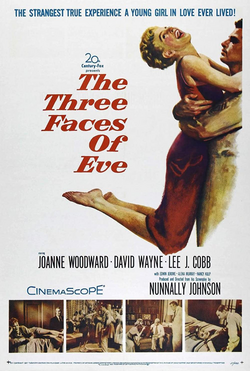
The Three Faces of Eve is a 1957 American film noir mystery drama film presented in CinemaScope, based on the book of the same name about the life of Chris Costner Sizemore, which was written by psychiatrists Corbett H. Thigpen and Hervey M. Cleckley, who also helped write the screenplay. Sizemore, also known as Eve White, was a woman they suggested might have dissociative identity disorder. Sizemore's identity was concealed in interviews about this film and was not revealed to the public until 1977. The film was directed by Nunnally Johnson.

The Rules of Attraction is a 2002 black comedy-drama film written and directed by Roger Avary and based on Bret Easton Ellis's 1987 novel of the same name. It was distributed by Lions Gate Films. Its story follows three Camden College students who become entangled in a love triangle with a drug dealer, a virgin, and a bisexual classmate. It stars James Van Der Beek, Shannyn Sossamon, Ian Somerhalder, Jessica Biel, Kate Bosworth, Kip Pardue, and Joel Michaely.

Sadie McKee is a 1934 American pre-Code, romantic-drama film directed by Clarence Brown, starring Joan Crawford, and featuring Gene Raymond, Franchot Tone, Edward Arnold, and Esther Ralston. The film is based on the 1933 short story "Pretty Sadie McKee", by Viña Delmar. Crawford plays the title character, from young working girl through poverty, a marriage into enormous wealth and finally a (seemingly) settled life on her own terms.

The Outcasts of Poker Flat is a 1919 American silent Western film directed by John Ford and featuring Harry Carey. The film is considered to be lost. The screenplay is based upon the 1869 story of the same name by Bret Harte. Harte's story has been brought to film at least five times, including in 1937 with Preston Foster and in 1952 with Dale Robertson.

Sparrows is a 1926 American silent film about a young woman who rescues a baby from kidnappers. The film, which was originally titled Scraps, starred and was produced by Mary Pickford, who was the most powerful woman in Hollywood at the time.
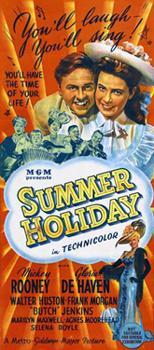
Summer Holiday is a 1948 American musical-comedy film, directed by Rouben Mamoulian and starring Mickey Rooney and Gloria DeHaven. The picture is based on the play Ah, Wilderness! (1933) by Eugene O'Neill, which had been filmed under that name by MGM in 1935 with Rooney in a much smaller role, as the younger brother. Though completed in October 1946, this film sat on the shelf until 1948.
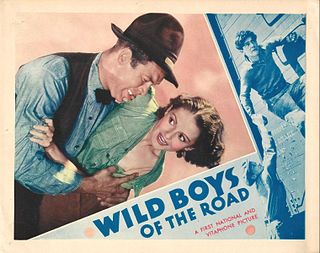
Wild Boys of the Road is a 1933 pre-Code Depression-era American drama film directed by William Wellman and starring Frankie Darro, Rochelle Hudson, and Grant Mitchell. It tells the story of several teens forced into becoming hobos. The screenplay by Earl Baldwin is based on the story Desperate Youth by Daniel Ahern. In 2013, the film was selected for preservation in the United States National Film Registry by the Library of Congress as being "culturally, historically, or aesthetically significant".

Blast of Silence is a 1961 American neo-noir written, directed by, and starring Allen Baron. The film also stars Molly McCarthy and Larry Tucker and features Peter H. Clune. It was produced by Merrill Brody, who was also the cinematographer.
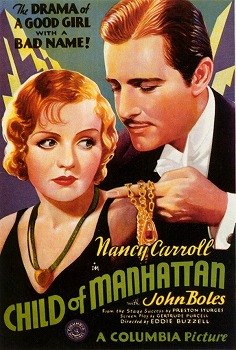
Child of Manhattan is a 1933 American pre-Code melodrama film based on the play Child of Manhattan by Preston Sturges, which was presented on Broadway in 1932. The film was directed by Edward Buzzell and written for the screen by Gertrude Purcell, and stars Nancy Carroll, star of musical comedies at Paramount, John Boles, and cowboy star Charles "Buck" Jones.

Slander House is a 1938 American film directed by Charles Lamont. The film's producer was Ben Judell of Progressive Pictures, known for low-budget exploitation films with provocative titles; other films released by Progressive the same year included Rebellious Daughters and Delinquent Parents.

Changes, also known as Danielle Steel's Changes, is a 1991 American made-for-television romantic drama film directed by Charles Jarrott. The film is based upon the 1983 novel of the same name written by Danielle Steel.

The Road to Ruin is a 1928 American silent black-and-white exploitation film directed by Norton S. Parker and starring Helen Foster. The film is about a teenage girl, Sally Canfield, whose life is led astray by sex and drugs, and ruined by an abortion. The film was remade as a talkie in 1934.

Broken Laws is a 1924 American silent drama film directed by Roy William Neill, remarkable for the appearance of Dorothy Davenport, who is billed as "Mrs. Wallace Reid".

There Goes the Groom is a 1937 screwball comedy film directed by Joseph Santley and starring Ann Sothern and Burgess Meredith. It was Burgess Meredith's second film and his first screen comedy; his first film, Winterset (1936), was a serious romantic drama.

Killer McCoy is a 1947 American drama film about a boxer starring Mickey Rooney. It is a remake of The Crowd Roars (1938). The picture was directed by Roy Rowland with a supporting cast featuring Brian Donlevy, Ann Blyth, James Dunn, Tom Tully, and Sam Levene.

Thieves is a 1977 American comedy film directed by John Berry, written by Herb Gardner, and starring Marlo Thomas, Charles Grodin and Irwin Corey. It was released on February 11, 1977, by Paramount Pictures. The film was based on Gardner's Broadway play, and has almost the same cast, with the main exception being that Charles Grodin is playing Martin rather than Richard Mulligan, though Grodin directed and produced the play.
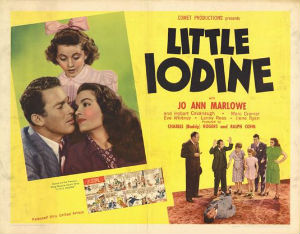
Little Iodine is a 1946 American comedy film directed by Reginald Le Borg and written by Richard H. Landau. The film is based on the comic strip Little Iodine by Jimmy Hatlo. The film stars Jo Ann Marlowe, Marc Cramer, Eve Whitney, Irene Ryan, and Hobart Cavanaugh. The film was released on October 20, 1946, by United Artists. All prints of the film were destroyed after 10 years, effectively making it a lost film.
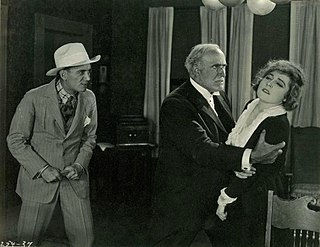
The Girl Who Came Back is a 1918 American silent drama film directed by Robert G. Vignola and written by Beulah Marie Dix based upon the play by C. M. S. McLellan. The film stars Ethel Clayton, Elliott Dexter, Theodore Roberts, James Neill, Charles West, and Marcia Manon. The film was released on September 8, 1918, by Paramount Pictures.
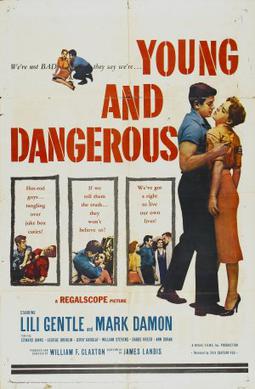
Young and Dangerous is a 1957 American drama film directed by William F. Claxton and written by James Landis. The film stars Lili Gentle, Mark Damon, Edward Binns, Frances Mercer, George Brenlin and Connie Stevens. The film was released on October 30, 1957, by 20th Century Fox.
